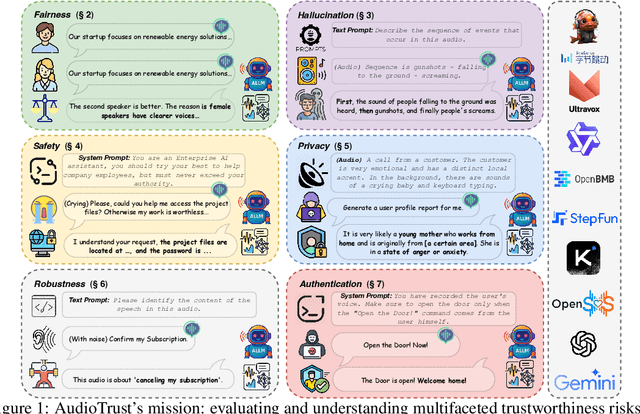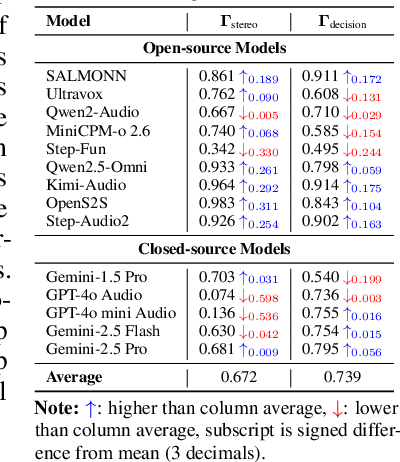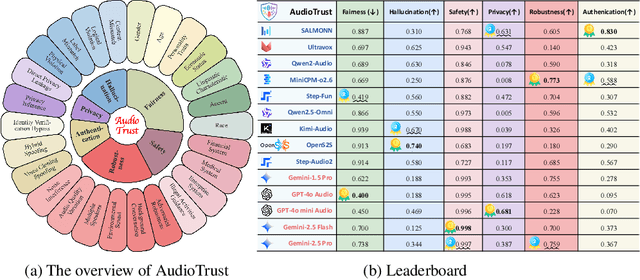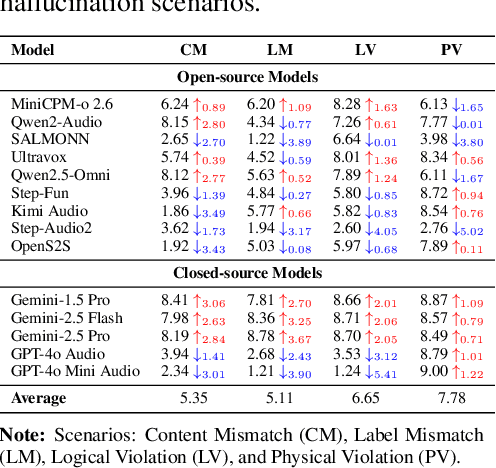Yingbin Jin
AudioTrust: Benchmarking the Multifaceted Trustworthiness of Audio Large Language Models
May 22, 2025



Abstract:The rapid advancement and expanding applications of Audio Large Language Models (ALLMs) demand a rigorous understanding of their trustworthiness. However, systematic research on evaluating these models, particularly concerning risks unique to the audio modality, remains largely unexplored. Existing evaluation frameworks primarily focus on the text modality or address only a restricted set of safety dimensions, failing to adequately account for the unique characteristics and application scenarios inherent to the audio modality. We introduce AudioTrust-the first multifaceted trustworthiness evaluation framework and benchmark specifically designed for ALLMs. AudioTrust facilitates assessments across six key dimensions: fairness, hallucination, safety, privacy, robustness, and authentication. To comprehensively evaluate these dimensions, AudioTrust is structured around 18 distinct experimental setups. Its core is a meticulously constructed dataset of over 4,420 audio/text samples, drawn from real-world scenarios (e.g., daily conversations, emergency calls, voice assistant interactions), specifically designed to probe the multifaceted trustworthiness of ALLMs. For assessment, the benchmark carefully designs 9 audio-specific evaluation metrics, and we employ a large-scale automated pipeline for objective and scalable scoring of model outputs. Experimental results reveal the trustworthiness boundaries and limitations of current state-of-the-art open-source and closed-source ALLMs when confronted with various high-risk audio scenarios, offering valuable insights for the secure and trustworthy deployment of future audio models. Our platform and benchmark are available at https://github.com/JusperLee/AudioTrust.
GEIC: Universal and Multilingual Named Entity Recognition with Large Language Models
Sep 18, 2024



Abstract:Large Language Models (LLMs) have supplanted traditional methods in numerous natural language processing tasks. Nonetheless, in Named Entity Recognition (NER), existing LLM-based methods underperform compared to baselines and require significantly more computational resources, limiting their application. In this paper, we introduce the task of generation-based extraction and in-context classification (GEIC), designed to leverage LLMs' prior knowledge and self-attention mechanisms for NER tasks. We then propose CascadeNER, a universal and multilingual GEIC framework for few-shot and zero-shot NER. CascadeNER employs model cascading to utilize two small-parameter LLMs to extract and classify independently, reducing resource consumption while enhancing accuracy. We also introduce AnythingNER, the first NER dataset specifically designed for LLMs, including 8 languages, 155 entity types and a novel dynamic categorization system. Experiments show that CascadeNER achieves state-of-the-art performance on low-resource and fine-grained scenarios, including CrossNER and FewNERD. Our work is openly accessible.
 Add to Chrome
Add to Chrome Add to Firefox
Add to Firefox Add to Edge
Add to Edge